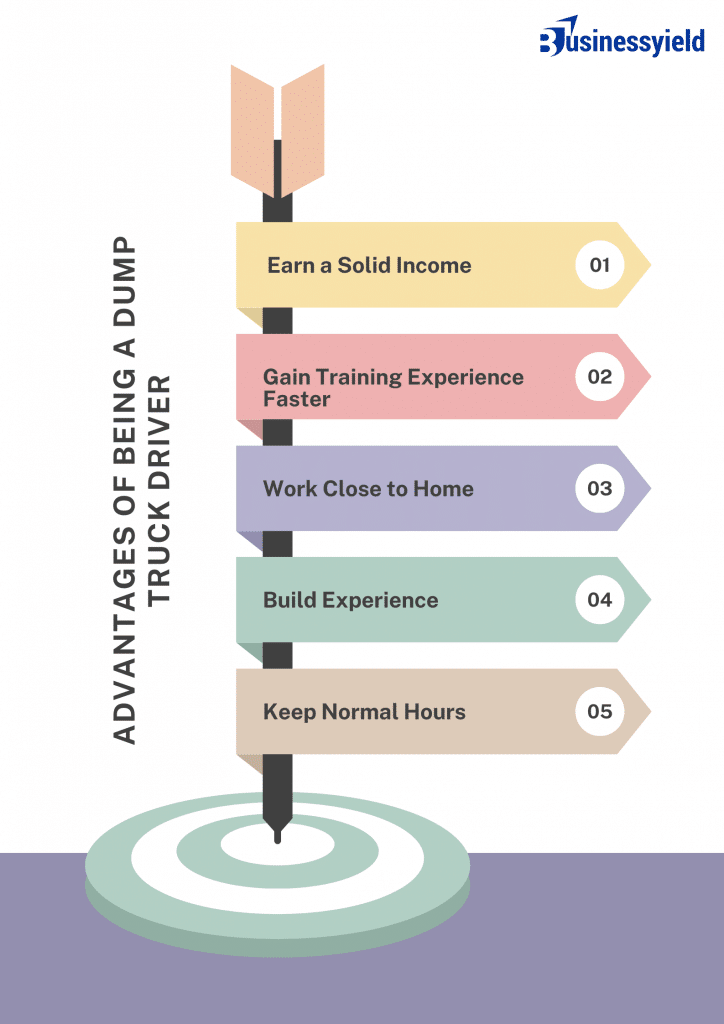Owning a dump truck can be a solid and profitable venture for several reasons, based on my experience and research in the industry. In recent findings, the average income for dump truck owner-operators in the U.S. exceeds $130,000 annually. This career path gives you flexibility to set your schedule, choose the jobs that suit you, and build valuable connections along the way. Unlike long-haul trucking, dump truck driving typically involves shorter local trips, allowing you to stay closer to home—a benefit that many drivers appreciate.
For example, a few years back, I worked with a driver who was able to schedule his weekly hauls around his kids’ events. It allowed him to attend family commitments without compromising on work. This kind of flexibility is a huge draw for many owner-operators.
However, it’s crucial to understand that pay for dump truck drivers varies significantly, with earnings ranging from about $47,500 at the 25th percentile to $194,000 at the 75th percentile. These differences come down to factors like location, experience, and ownership costs. In this article, I’ll provide you with reliable, fact-based insights into these income factors to help you get a realistic sense of what to expect as a dump truck driver, drawing on verified data and real-world considerations.
Key Takeaways
- Dump truck drivers need a commercial driver’s license (CDL), typically a Class B for standard trucks and a Class A for larger tractor-trailer dump trucks, which allows for heavier loads.
- Dump truck driver pay varies based on factors like location and experience. Fleet drivers earn hourly, with rates from $17 to $30, while owner-operators keep the full income after expenses, with earnings between $40,000 and $197,000 annually.
- Income for dump truck drivers can be influenced by location, experience, and ownership costs. Higher-paying states and cities may also bring more competition, and experienced drivers can reduce costs through efficient truck use.
- Ownership costs are significant, with new trucks priced around $100,000 or more, alongside expenses like fuel, maintenance, and insurance. Owner-operators need to budget carefully to cover these costs while maintaining profitability.
- Benefits include steady local work, allowing for more family time, quicker entry into the field, and building skills that could lead to opportunities with additional equipment in construction.
- The role has drawbacks, such as seasonal employment, job stability influenced by the economy, and physical demands. Weather and solitary driving can also impact the daily work experience, but strategies like listening to audiobooks can help combat the isolation.
Who Exactly is a dump truck driver?
A dump truck driver is a trained professional who drives an open-bed hydraulic truck carrying loose materials such as gravel, dirt, mulch, rock, and waste. They often work in agriculture and construction, operating the driver controls to pour materials at the dump site. Their responsibilities also include maintaining the vehicle’s interior and exterior. They are also involved in:
- Tracking work and vehicle servicing
- Securing things safely in the vehicle.
- Completing papers.
- Driving Professionally
- Following traffic laws and safety protocols
As a dump truck driver, you must hold a commercial driver’s license (CDL), such as the following:
- Class B: With the Class B CDL, you can operate trailers with a gross vehicle weight rating of less than 10,000 pounds, similar to a conventional straight dump truck.
- Class A: This class allows you to operate trailers with a gross vehicle weight rating of more than 10,000 pounds, including tractor-trailer dump trucks, which move more material faster and are larger and longer than typical straight dump trucks.
How Much Does a Dump Truck Driver Make?
If you drive a fleet of dump trucks, you typically get paid hourly for every gig you take on. The minimum wage for most fleet drivers is $17 per hour. Some businesses, though, will nearly quadruple that amount to $30 per hour. You keep the money that you earn. The business is in charge of all truck-related expenses. Additionally, depending on the work and related responsibilities, overtime might increase your pay to an average of $27.83 per hour. Truck drivers who want experience can benefit greatly from this contract work.
There are drawbacks to driving for a fleet, though. One challenge that often surprises new drivers is how seasonal work can be. During winter, particularly in northern states, construction contracts might slow down significantly. This implies that you won’t be compensated if the organization has no gigs for you to work on. Having additional income streams, like smaller freelance hauling gigs, can help bridge these gaps. I have seen many drivers turn to working part-time jobs in lumber yards or plants or working for many fleets concurrently.
Important Elements Influencing Dump Truck Drivers Income
#1.Location
The difference in average salary between the highest and lowest-earning states might reach forty thousand dollars. Your advantage could come from a larger hourly wage, depending on where you live. With an average salary of more than $140,000, New York, Massachusetts, and Washington are the states with the highest wages.
What this means in reality is that a driver in New York might secure contracts worth up to $140,000 annually, but they’ll face higher competition and costs. Meanwhile, a driver in Columbus, Ohio, may bring in closer to $70,000, yet with lower living expenses and steady local work, this balance can be just as rewarding.
On the other hand, North Carolina, Florida, and Missouri have the lowest salaries.
But more pay also means increased competition. If you’re a new owner, consider your abilities and how well you can market your services in the local construction industry.
Consider more than just your current condition. Even though the state-wide averages are lower, some cities and metro areas, including Columbus, Ohio, and Fort Wayne, Indiana, pay exceptionally well.
#2. Experience Years & Skill Level
The average time to obtain a commercial driver’s license (CDL) is less than two months, indicating a low entrance barrier. However, nothing replaces on-the-job experience.
That expertise will help you get new business and teach you cost-cutting techniques. Skilled drivers can save expenses by selecting appropriate assignments, using the truck effectively, and knowing how to maintain a car.
You’ll establish yourself as a dependable driver in your community, and your reputation will raise the demand for your services.
#3. Costs of Owning a Truck
After you know the expenses associated with having a dump truck, you should think about how ownership will impact your ability to make money. Newer models usually sell for $100–150,000, but used dump trucks can range in price from $30–40,000.
With available financing options, you can pay for the truck gradually. According to a top truck financing provider, an authorized transaction typically requires a credit score of 677.
Your down payment, credit score, and car’s price will affect your monthly payment.
Beyond the truck purchase, weekly fuel expenses can exceed $1,400 depending on mileage. And, with tires priced at around $1,000 each, it’s clear that maintaining the truck adds up.
Plus from the truck’s initial cost, you’ll also have recurring costs such as:
- Coverage ($6,750–$20,000 per year)
- Fuel (depending on mileage and petrol prices; at 3,000 miles, this comes out to more than $1,400 each week)
- Examinations (When Required)
- Department of Transportation charges
- Taxes for Registration
- Promoting your company
You’ll need to compare your prospective pay with your ability to cover the car’s purchase price and anticipated and unforeseen maintenance bills.
To determine how many hours a week you would need to work, you could find it helpful to assess your hourly expenditures to operate your truck using the typical hourly rate in your area.
How to Make a Living as a Dump Truck Driver
Dump truck drivers receive an hourly wage, but owner-operators usually keep all of the company’s profits or split them with a business partner. Depending on the performance of their enterprise, the annual compensation for a dump truck owner-operator ranges from $40,000 to $197,000.
Of course, owner-operators have many more recurring costs that could threaten their income. They are responsible for maintenance, insurance, petrol expenses, and the truck. They are also in charge of creating a clientele and cultivating a devoted following.
Finding competent drivers, preparing for unforeseen expenses, and finding work to keep your trucks active are drawbacks to being a business owner.
#1. Additional Factors at Work
You must pay for your schooling and training to obtain your dump truck driver’s license. Most trucking schools charge $3,000 for the full dump truck driver training course. It will likely take a year to obtain your CDL.
Pay is higher for jobs with the most significant hazards. Nonetheless, dump truck drivers are among the top-paid workers in the sector. Because driving for a coal mine entails extra risk, you should anticipate considerably higher rates. Loading and unloading the vehicles requires a great deal of focus and patience. The tiniest abrupt movement will cause the mine to collapse if truck drivers are not cautious.
#2. Improve Your Company
You can increase your earnings as a fleet driver by taking on more frequent tasks. Of course, it’s easier said than done. The majority of dump truck positions have a limited hiring window. If you are in Massachusetts, you cannot expect to be prepared for a job in Montana in two days. You cannot even know the jobs within your perimeter without the proper equipment.
You probably have a full schedule of dump truck work as an owner-operator. However, what happens when there is a lull in your business? Slow times are the most significant nightmare for an owner-operator because they can lower your dump truck pay.
For new drivers, my advice is to start by connecting with local contractors and taking smaller jobs, even if they aren’t top-paying. Building a solid reputation leads to consistent contracts, particularly in off-peak seasons. Also, create a financial cushion for yourself—having savings on hand can make all the difference during slower months.
Advantages of Being a Dump Truck Driver

For me, one of the major perks of owning a dump truck is the direct control over income and work hours. However, it’s not without its trade-offs: the workload can be unpredictable, and all maintenance costs fall to the owner. Yet, the autonomy and freedom are well worth it, especially for those who thrive in self-directed work environments.
Regardless, here are six major advantages of being a dump truck driver to consider when pursuing this career path:
#1. Earn a Solid Income
Driving a dump truck provides a consistent hourly wage compared to open-road driving, which pays per mile. The national average annual compensation for a dump truck driver is $44,607. Wages and salaries might vary depending on location, company, years of experience, certifications, and training. Furthermore, unionized jobs frequently offer even higher pay averages.
Dump Truck Maintenance Schedule Template.pdf
#2. Gain Training Experience Faster
Becoming a dump truck driver requires a relatively quick learning period, allowing you to enter the profession faster than other jobs. On average, you can obtain a Class B CDL in a month or two. Some companies even provide programs to get your license while training. Drivers incur significantly less debt and expenditure than do colleges or technical schools.
Job Opportunity Tracker Template.pdf
#3. Work Close to Home
Instead of driving one load across the country and back, dump truck drivers work numerous daily loads in a specific location, such as delivering gravel to a building site. Because you’re not driving a long distance, local loads allow dump truck drivers to spend more time with their families and sleep in their beds rather than on the interstate conducting multi-day distribution deliveries.
#4. Build Experience
The more experience you have, the better your chances of getting a job. Operating heavy construction equipment and machinery and driving a dump truck provides excellent resume content for this field. As a result of your dump truck driving expertise, you may be able to work with other construction equipment, such as earthmovers and diggers that load dump trucks in the future. Furthermore, some construction companies may pay for your certification to operate different equipment because having more talents and abilities within a crew results in a more valuable team on the job site.
#5. Keep Normal Hours
As a dump truck driver, your workweek is frequently more conventional, with hours similar to daytime shifts in a five-day workweek, unlike road truckers, who depart on multi-day excursions with scheduled shift driving and rest breaks. Depending on the company you work for or the job site criteria, you may work weekends, holidays, or overtime, but you still have more freedom in your personal life than truck drivers on the road.
Disadvantages of Operating a Dump Truck
There are several disadvantages of being a dump truck driver to consider when researching this career path—here are six.
#1. Repetitive Work
Dump truck drivers perform several repetitious tasks. As a dump truck driver, you typically travel the same route, often multiple times in a single day. Many dump truck drivers drive to the material pickup location, wait in line, pick up material, return, dump items at the dump site, and repeat the cycle. Dump truck driving may appear dull compared to the variety of landscape or driving routes available to open-road drivers. To fight this, consider changing your driving route, getting fresh air outside the vehicle, and stretching your muscles.
#2. Long Working Days
Dump truck drivers work an average of 10 hours a day. You may become fatigued due to the repetitive work required to follow safety measures on construction or agricultural sites. To overcome this, establish excellent sleeping and wellness routines and seek advice from colleagues on other best practices.
#3. Inconsistent Job Offers
Independent dump truck drivers may experience employment lapses or have trouble acquiring new jobs. Establishing solid ties within the industry is beneficial, as many drivers rely on prior employers to get work.
#4. Influenced by the Economy
Because dump truck drivers frequently engage in construction, job opportunities can fluctuate based on economic conditions. A robust national economy leads to a thriving construction industry. Work may slow down during economic downturns. However, as a dump truck driver with a commercial driver’s license, you may consider transferring to another form of truck driving during the off-season or economic downturns.
Being a dump truck driver may be a seasonal occupation depending on where you reside. For example, much construction work is done in the summer, whereas there is less employment in the winter—especially if you live in a northern state with cold weather and snow.
As a dump truck driver, you may encounter many weather conditions, such as high heat or cold rain, and work in muddy and dusty locations. Depending on the weather in your area, your job site may be temporarily closed due to hurricanes, flooding, or tornadoes. Furthermore, remember that dump trucks may lack some comfort features, such as air conditioning or heat, so dress appropriately.
#6. Solitary Driving
Because dump truck driving is a one-man job, you will spend a lot of time alone. While this is beneficial for introverts, alone time can also lead to loneliness. With minimal human interaction and a lot of solitary driving, you can combat loneliness by listening to podcasts and audiobooks, playing the radio, or safely making a phone call to friends and family using a hands-free device.
How much do dump truck drivers make in the US?
As of October 8, 2024, the average hourly wage for a dump truck driver in the United States is $23.03.
How much are truck drivers paid in Nigeria?
A truck driver’s total monthly compensation in Nigeria is predicted to be NGN 370,208, with an average wage of NGN 100,000.
How much do dump truck drivers make in the UK?
According to the ONS, a dumper driver earns an annual median wage of £31,200, or £16 per hour. Your starting salary will be £28,278 per year. With a few years of experience and extra degrees, your income will rise to £34,125 per year.
How much is a dump truck in the USA?
New dump trucks start at about $100,000 and can easily cost $150,000 or more. New Kenworth dump trucks are priced at the upper end, starting at around $180,000. Used dump trucks often cost between $30,000 and $40,000.
Conclusion
If you’re considering a career in dump truck ownership, start with a clear plan that balances the income potential with the inevitable challenges. With the right preparation, each job can be more than just a paycheck—it can be a step toward building a stable, rewarding business.
- PUMP AND DUMP SCHEME: Definition, Types, and Examples
- Dollar Gains In Strength Due To Pandemics
- HOW TO START A FOOD TRUCK: Complete Guides and Easy Steps to Take
- How to Start a Trucking Business in 8 Steps






